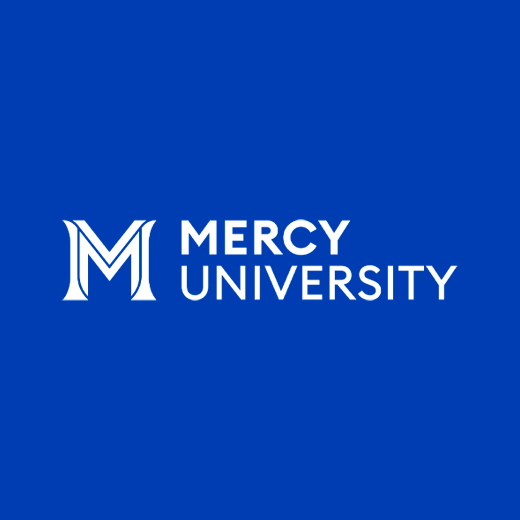Veterinary Technology
- 120 Credits
- School of Health and Natural Sciences
- Westchester
We are no longer accepting applications to the Veterinary Technology program effective immediately. We continue to offer a strong path for you interest through our Animal Sciences major.
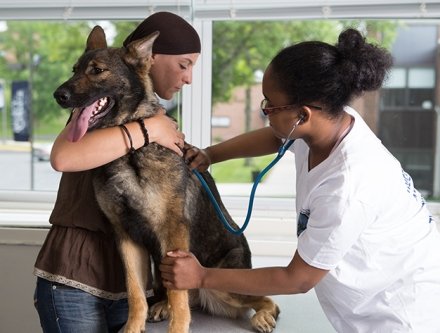
Veterinary Technology Overview
Our program draws students from all around the country. Students receive the best training possible and graduates have had 98 percent pass rate on the national board examination for 20+ years.
Imagine practicing as a veterinary technologist, a highly educated and skilled member of the animal health care team. Today's veterinary technologists are licensed professionals who team with veterinarians to offer state-of-the-art veterinary care. The Mercy University Veterinary Technology Program is fully accredited by the American Veterinary Medical Association Committee on Veterinary Technician Education and Activities (AVMA CVTEA) and leads to a four-year Bachelor of Science degree and the title, veterinary technologist.
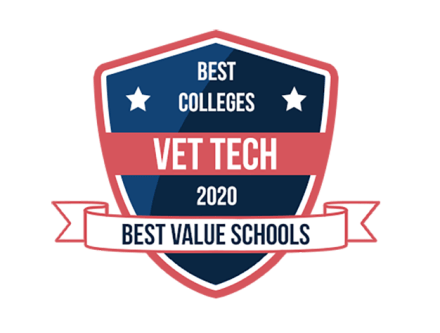
Veterinary Technology Fast Facts
- Named one of Top Ten Best Value Schools
- Externships at top veterinary practices, ultra-sophisticated, multi-specialty centers and zoos
- Consistent demand for Mercy Veterinary Technology Program graduates
- Articulation agreement with Ross University School of Veterinary Medicine that reserves two seats per enrollment period for qualified students.
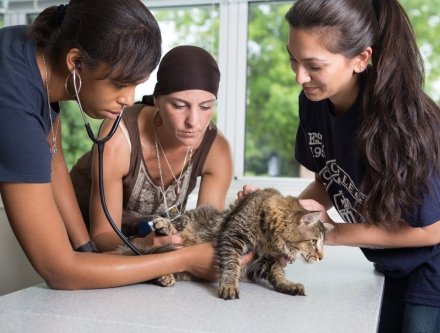
Career Opportunities
According to the United States Bureau of Labor Statistics, employment for licensed veterinary technologists is expected to grow 21% over the next ten years, which is must faster than the average (U.S. Bureau of Labor Statistics, 2022). Veterinary Technologists practice in an expanding variety of areas, including small animal medicine, large animal medicine, exotic animal medicine, zoo animal medicine, marine animal medicine, equine medicine, wildlife medicine, and shelter medicine. There are opportunities in areas of specialization, such as emergency and critical care medicine, anesthesia, surgery, dentistry, internal medicine, ophthalmology, diagnostic imaging, and physical rehabilitation. Other career opportunities include:
- Public Health
- Industry
- Research
- Education
- Government
- Military
- Practice management
- Clinical laboratory
- Conservation
Want More Info?
We'd like to hear from you! Get more information.
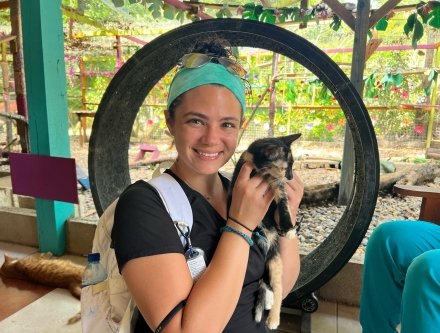
Vet Tech Program featured in Westchester Magazine!
Mercy University’s esteemed Veterinary Technician program has recently garnered attention in Westchester Magazine for its exceptional quality and impact. Highlighted for its comprehensive curriculum, state-of-the-art facilities, and dedicated faculty, the program stands out as a premier choice for aspiring vet techs.
Our Students In Belize Transforming Lives!
Mercy University Vet Tech students in Belize work to deliver life-saving animal care to a small village. They paid it forward and got a lot back in return.
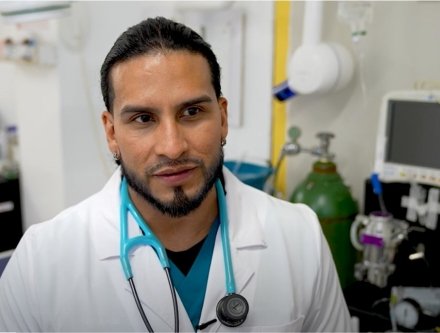
Meet Program Alumni, Dr. David Arias
Dr. David Arias is an alumni of the Veterinary Technology program who went on to veterinary medical school. He now runs his established practice in the neighborhood where he grew up.
Veterinary Technology Student Surgery Day
- See our Veterinary Technology students at a recent surgery day assisting in spaying and neutering local shelter animals. These memorable learning experiences are just part of the Veterinary Technology Program.
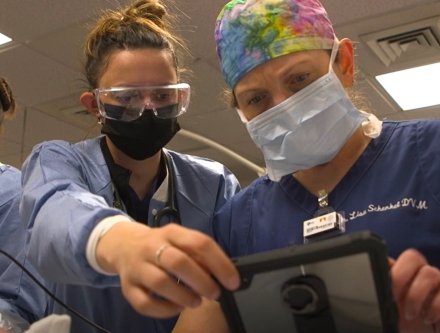
Meet Veterinary Technology Students
Hear from some of the Veterinary Technology students about why they chose the profession and Mercy University.
Frequently Asked Questions
The curriculum is academically rigorous and scientifically oriented. It is designed for the motivated learner who can successfully pursue an intense educational experience. The student must possess a strong ability to focus and a serious interest in a career in veterinary medicine. Along with solid academic skills, the student must have compassion for animals, empathy and concern for people, and the capacity to work cooperatively and productively with others.
Veterinary Technicians are graduates of two-year veterinary technician schools and earn Associate degrees. Veterinary Technologists are graduates of AVMA-approved, four-year veterinary technology schools and earn a Bachelor of Science degree in veterinary technology. Both are educated to be the veterinarian's nurse, laboratory technician, radiography technician, anesthetist, surgical nurse and client educator. Veterinary technologists often achieve more lucrative careers in veterinary medicine, assuming supervisory and management positions in veterinary facilities and biomedical research institutions.
Full-time students can complete the 120-credit degree program in four years.
Yes, faculty are available to help students with questions about what courses to take, the sequencing of courses and career opportunities, including externships and cooperative education.
Satisfactory completion of VETC 101 Introduction to Veterinary Science, BIOL 160 General Biology I, BIOL 160A General Biology I Laboratory with a grade of C+ or better, and ENGL 111 Written English and Literary Studies I and Math 116 College Algebra with a grade of B or better. All courses that are required for admission into the Veterinary Technology program may not be repeated more than once. Please note that to maintain eligibility for admission into and to continue in the Program students must earn a minimum letter grade of C or better in all veterinary technology and natural science courses, and a minimum grade of B or better in ENGL 111 Written English and Literary Studies I and MATH 116 College Algebra. Students must maintain a 2.75 cumulative index in veterinary technology courses in order to be admitted into clinical courses VETC 340, VETC 341, VETC 350, VETC 350A, VETC 360, VETC 375, VETC 495, and VETC 496.
Yes. You can take as little as one course per semester.
The four-year Veterinary Technology Program at Mercy University is one of the few programs nationwide to offer a Bachelor of Science degree. Graduates often qualify for supervisory and management positions that favor the more advanced education provided by a Bachelor's degree. The first two years are devoted to intense academic coursework and the second two years provide extensive clinical experience, including two full-semester externships. This considerable amount of clinical training, combined with in-depth scientific and medical knowledge, offers you superior skills and competence. As a result, graduates of Mercy's Veterinary Technology Program have achieved a 98% passing rate on the VTNE for over 20 years. The program also is unique in offering qualified students the opportunity to complete advanced externships in specialties such as surgical nursing and anesthesia; emergency and critical care nursing; dentistry; ophthalmology; small animal internal medicine; exotic animal medicine; oncology; and zoo animal medicine and surgery.
Program Details & Curriculum
General Education Requirements*: 60 Credits
Major Concentration: Veterinary Technology: 58 Credits
Veterinary Technology Elective: 2 Credits
Total: 120 Credits
The program's primary objective is to provide graduates with a superior education combined with the technical skills they need to succeed as veterinary technologists. This is a comprehensive program that emphasizes development of the critical thinking, in-depth knowledge and technical skills needed for professional success. Affiliations with ultra-sophisticated, multi-specialty practices provide cutting-edge instruction by nationally renowned experts both on- and off-campus.
Program graduates qualify to take the Veterinary Technician National Exam (VTNE), the credentialing examination that is available only to graduates of AVMA-accredited veterinary technology schools and is required for licensure in New York State.
Graduates of Mercy's Veterinary Technology Program have achieved a 98% passing rate on the VTNE for 20+ years.
PROGRAM MISSION STATEMENT
The Mercy University Veterinary Technology Program is committed to providing motivated students the opportunity to transform their lives by preparing them for rewarding careers as professionals in the fields of veterinary health and science, guided by high ethical standards and a dedication to lifelong continuing education.
Admission to the Veterinary Technology Program is a competitive, multi-step process. Students must first be admitted to Mercy University. Students who meet the following criteria will be admitted as undecided-veterinary technology majors (VTPR):
Required
- Overall high school GPA 85% or higher
- Minimum of two years of high school Math with 85% (B) average or higher
- Minimum of two years high school English with 85% (B) average or higher
- Minimum of two years high school Laboratory Science with 85% (B) average or higher
Preferred
- High school rank in upper third of class
- More than two years high school Math with one year of algebra
- More than two years high school English
- More than two years high school Laboratory Science; preference for one year each in biology and chemistry
Students that do not meet the high school assessment criteria will be required to take additional courses. Students who meet the high school criteria will follow the sequence below for their first year:
First Semester - 16 credits
- Critical Inquiry - CINQ 101
- Written English & Literary Studies I - ENGL 111
- College Algebra - MATH 116
- General Biology I Lecture and Lab - BIOL 160/160A
- Oral Communications - SPCM 110
Second Semester - 14 credits
- Introduction to Veterinary Science - VETC 101
- General Biology II Lecture & Lab - BIOL 161/161A
- General Chemistry I Lecture & Lab - CHEM 160/160A
- Written English & Literary Studies II - ENGL 112
To progress to the veterinary technology courses as veterinary technology majors (VTNS), students must complete the first year with the following performance:
- Minimal overall GPA of first year 2.75
- MATH 116 minimum grade of B
- ENGL 111 minimum grade of B
- BIOL 160/160A minimum grade of C+
- VETC 101 minimum grade of C
Students who meet the above criteria will be required to write an essay to demonstrate competence in written English and understanding of the profession of veterinary technology.
- The policy for acceptance of transfer credits to satisfy Veterinary Technology Program courses are in addition to the requirements for transfer credits as outlined in the Mercy University Undergraduate Catalog.
- Course descriptions and course outlines of any veterinary technology course for which the student is requesting acceptance of transfer credits must be submitted to the Program Director for review. In addition, for any veterinary technology course in which essential skills are taught, the student must also submit a signed skills list for that course to the Program Director.
- Acceptance of transfer credits for a veterinary technology course will only be considered if the course was taken within the last three years at an AVMA-CVTEA accredited veterinary technology program, the credit hours and course content are equivalent and the final grade in the course is C or better.
- Fifteen residency credits at Mercy University in the major are required.
- VETC 101 Introduction to Veterinary Science and VETC 320 Pharmacology and Toxicology must be taken at Mercy University, Dobbs Ferry.
- Transfer credits for VETC 300 Physiology of Domestic Animals and VET 306 Clinical Laboratory Techniques Lecture will be accepted if the following criteria are met:
- taken within the last three years at an AVMA-CVTEA accredited veterinary technology program
- the credit hours and course content are equivalent
- the final grade in the course is C or better
- the student has successfully passed a competency exam, administered by Mercy University Veterinary Technology Program faculty, with a 73 or better.
- The cost of each competency exam is $25.
- Acceptance of transfer credits to satisfy prerequisite course requirements will only be considered if the course was taken within the last four years at an accredited college institution, the credit hours and course content are equivalent and the final grade in the course is C or better.
- EXCEPTION: ENGL 111 and MATH 116 – final grade in the course is B or better.
- Graduates of AVMA-CVTEA accredited veterinary technology programs must submit their transcripts, course descriptions and signed skills lists to the Program Director for review. Graduates of other programs are required to take VETC 101 and VETC 320 at Mercy University, Dobbs Ferry.
- Transfer students that are graduates of other accredited veterinary technology programs will be required to complete all of the requirements of the Mercy University Veterinary Technology Program courses that they take at Mercy University. This may include successful acquisition of essential skills as listed in the Mercy University Veterinary Technology Program Essential Skills List for that course.
- Students must earn a minimum letter grade of C or better in all veterinary technology courses, a grade of C+ or better in BIOL 160/160A General Biology I Lecture/Laboratory, a minimum grade of C in all natural science courses, and a minimum grade of B or better in ENGL 111 Written English and Literary Studies I and MATH 116 College Algebra.
- Students must maintain a 2.75 cumulative index in veterinary technology courses in order to be admitted into clinical courses VETC 340, VETC 341, VETC 350, VETC 350A, VETC 360, VETC 375, VETC 495, and VETC 496. A minimum GPA of 2.75 is also required for graduation from the Veterinary Technology Program.
- Students may not repeat a course required in the curriculum more than once. Two withdrawals from a course are equivalent to one full completion of that course.
- Any student who earns a grade less than the required minimum grade in a course required in the curriculum must repeat the course the next semester it is offered at Mercy University in order to progress to any course for which it is a Prerequisite.
- Any student who receives less than the required minimum grade in a course required in the curriculum more than once will automatically be dismissed from the Program.
- For any veterinary technology lecture course that has a laboratory course as a corequisite, both the lecture and laboratory courses must be taken concurrently. In the event that a student must withdraw from the lecture course, the student must also withdraw from the corequisite laboratory course. Students who wish to take the lecture or laboratory course alone will require program director authorization and may be required to participate in relevant labs or audit relevant lecture topics.
- With the exception of VETC 375 Principles of Large Animal Medicine, Veterinary Technology courses within the Veterinary Technology curriculum are not offered in the summer semester.
- Students who receive an unsatisfactory evaluation in any category, including but not limited to professional and ethical behavior, or required skill in clinical courses VETC 340, VETC 341, VETC 350, VETC 350A, VETC 360, VETC 375, VETC 495, or VETC 496, or who are dismissed from any externship site, will receive an “F” in the course and will have their records reviewed by the Veterinary Technology Faculty. The faculty will determine if the student will be given the opportunity to repeat the experience in a future semester, and/or be placed on probation, or be dismissed by the Program.
- If a student is dismissed from any externship site because of an inability to demonstrate content knowledge, the faculty may require the student to pass a competency exam and either retake or audit the course covering the content prior to reassignment to an externship site.
- Any student that has been dismissed from the Veterinary Technology Program is not eligible to reapply to the Veterinary Technology Program.
|
ITEM |
COST PER SEMESTER |
TOTAL COST FOR 4 YEARS |
|
FULL TIME TUITION |
$10,259.00 |
$82,072 |
|
FULL TIME REGISTRATION FEE |
$420.00 |
$3,360 |
|
BOOKS/SUPPLIES |
$838.00 |
$6,704 |
|
COURSE FEES** |
Depends on course |
$3,670 |
|
|
|
|
|
TOTAL* |
|
$95,806 |
|
|
|
|
*Illustration based on a 3% increase annually, however tuition and fees are subject to change.
According to FAFSA (Free Application for Federal Student Aid), the cost of attendance is defined as the amount of attending the program includes tuition and fees, books, supplies, transportation, loan fees, as well as fees associated with distance education.
**Tuition and Fee information for the Undergraduate Mercy specific courses is located here: Mercy University – Veterinary Technology Program Tuition and Fees
Minimal Technical Standards
The following technical standards, which serve to protect the student and patient and are deemed essential for performance as a competent veterinary technologist, are required for admission, continuation and graduation from the Mercy University Veterinary Technology Program:
Essential Requirements
- Capable of frequently lifting and/or carrying up to 50 pounds from floor to waist level.
- Ability to tolerate walking and standing for sustained periods of time.
- Capable of handling, positioning and restraining live animals.
- Capable of using hands and arms to handle, install, position and move materials.
- Auditory ability sufficient to monitor and assess health needs, including auscultatory sounds, alarms, animal vocalizations, cries for help and warning sounds from animals and humans. Ability to perceive and understand the natural or amplified human voice when lips, facial expressions and/or other visual clues are not able to be seen.
- Tactile ability sufficient for physical assessment and to perform nursing duties.
- Eyesight capable of viewing small visual images and reading instrumentation.
- Amenable to learning the safe handling and restraint of all Program-required species of domestic and exotic animals without a level of fear that interferes with satisfactory performance.
- Capacities to read, hear, understand and quickly execute complex verbal and written instructions given in English.
- Willingness to assist with or perform a wide variety of medical, surgical and diagnostic procedures in the veterinary setting, including humane euthanasia.
- Ability to act in a professional and ethical manner. Ability to respond positively to constructive criticism.
- Ability to respond promptly and appropriately in emergency situations. Emotional stability to function effectively under stress and to adapt to an environment that may change rapidly without warning and/or in unpredictable ways.
- Ability to speak and write in English and be understood by others who speak English.
- Ability to understand the basis and content of ethical veterinary practice and the professionalism required in such practice. Possession of attributes which include compassion, empathy, altruism, integrity, responsibility, and tolerance.
- Cognitive abilities necessary to master relevant content in the curriculum at a level deemed appropriate by the faculty. These skill may be described as the ability to comprehend, memorize, analyze, and synthesize the material. Ability to develop reasoning, critical thinking and decision-making skills at a level deemed appropriate by the faculty.
- The ability to handle and/or be exposed to a wide variety of animal species and their environments without adverse medical consequences (e.g., allergic reaction).
Veterinary Technology Student Essential Skills
Mercy's program requires that students successfully acquire specified, essential skills in order to complete the Veterinary Technology Program. A link to these skills may be found here.
Students enrolled in the Veterinary Technology Program will be exposed to live animals, both on and off-campus. Due to the inherent risk of possible exposure to an animal carrying the rabies virus, all students enrolled in the Veterinary Technology Program are required to receive the prophylactic series of rabies immunizations. For more information, please follow this link: https://www.cdc.gov/rabies/prevention/pre-exposure_vaccinations.html
VTNE Pass Rates
| January 1, 2022 – December 31, 2024 | |
| Number of first-time candidates that have taken the VTNE | 61 |
| Three-year VTNE pass percentage | 98.36% |
The Veterinary Technology Program is accredited by the Committee on Veterinary Technician Education and Activities (CVTEA) of the American Veterinary Medical Association (AVMA) located in Schaumburg, Illinois.
Graduates of the Mercy University Veterinary Technology Program are eligible to sit for the Veterinary Technician National Examination (VTNE) administered by the American Association of Veterinary State Boards (AAVSB). Successful completion of this examination is required for licensure as a veterinary technician by the New York State Education Department (NYSED). Licensure information can be found at http://www.op.nysed.gov/prof/vetmed/vtlic.htm.
NOTE: A felony conviction may affect a graduate's ability to attain state licensure.
The Veterinary Technology program leads to a professional license administered by each state. Applicants and potential students should review information available on the University's NC-SARA page. We advise you to contact your state licensing board or appropriate licensing entity to determine whether the program meets requirements for Professional Licensure in the state where you are located or the state in which you intend to pursue licensure. Please contact the VET TECH Program Director if you have further questions.
Download a copy of the sequence map for:
ARCHIVE
- 2024 - 2025 B.S. Veterinary Technology
- 2023 - 2024 B.S. Veterinary Technology
- 2022-2023 B.S. Veterinary Technology
- 2021-2022 B.S. Veterinary Technology
2020 - 2021 B.S. Veterinary Technology
Veterinary Technology Program students interested in applying for veterinary medical school may choose to pursue a Pre-Veterinary Medical School Optional Elective Course Block. This optional block of elective courses is not part of the Veterinary Technology Program curriculum, and therefore, completion of these elective courses is not required to earn a Bachelor of Science degree in Veterinary Technology. By completing the Pre-Veterinary Medical School Optional Elective Course Block as well as earning the Bachelor of Science degree in Veterinary Technology, students are eligible to take the Veterinary Technician National Examination for licensure as a Veterinary Technologist and meet the clinical/animal experience and prerequisite course requirements for application to veterinary medical school.
Contact the Veterinary Technology Program
Dr. Lisa Schenkel
Program Director, Veterinary Technology
lschenkel@mercy.edu






